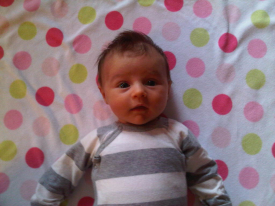 Congrats! You’re expecting a baby! Start talking, baby!
Congrats! You’re expecting a baby! Start talking, baby!
Not the baby. I mean YOU.
These days we know it’s not so crazy as it sounds: that developing children’s literacy skills actually begin during pregnancy. When mothers talk to their babies while they’re still in the womb many researchers believe that’s actually the first step in language development.
Babies get used to the sound of their mother’s voice and perhaps when they are born, that familiarity lends itself to quicker recognition and a fast bond after birth.
Of course when babies are born, their parents continue speaking and babies start to recognize sounds and get to know gestures and facial expressions. Babies learn so much from the sights and sounds around them and will begin, almost immediately, to try to imitate the sounds their parents make. This is all part of the process of babies figuring out how we communicate with each other. They start to recognize how we relay information to each other in narrative form and begin to learn how to do that themselves.
We begin to see babies’ story-telling skills emerge in the toddler days when they launch into those animated baby monologues. My son Benny was very big on long stories told aloud to his plastic “aminals”. Only he and the toys knew what he was saying!
But that isn’t even really trued because if we listen carefully to one of those stories that babies tell, we can actually follow along, because, the child is so excited in relaying the details to us. It is very much like watching a TV show in a foreign language. If you watch it long enough, you begin to follow the story, even if you don’t understand a word of it. That is the power of the narrative – and the baby has learned that skill from watching and listening to us.
If you’re anything like me, you’ll have no problem doing the following: use every opportunity throughout the day to talk to your baby. If Mango (our dog) had the skills, he’d be talking a blue streak by now! I narrate everything when we’re together, and you can do the same with babies (you think the fact that my kids are too big to do this with now has something to do with my canine conversations?) But I digress…talk to the kid about anything and everything. That’s a great way to build up the babies’ early literacy foundation. When washing the dishes or making dinner or cleaning up, parents can explain the tasks they are doing to their baby. Babies will begin to hear familiar words if the parents are in the habit of doing this frequently.
But don’t use baby talk! Normal tones work even better. Experts suggest parents speak properly to their children, so the children can have the most possible exposure to the correct sound of words. For example, if a child has a ‘baby word’ for banana, and the parent constantly uses that ‘baby word’ back to the child, they are only reinforcing the incorrect pronunciation.
I will admit, as goofy as it is, that my husband and I got used to certain words our kids (mis)used. So though the children might now say, “Please pass the strawberries,” I’d tell Jerry, “Please pass the ba-ba-dees.”
But even if a parent sometimes uses their babies’ pronunciations of words, the important point is that the child is being talked to frequently throughout their day. It is an essential building block of language, and therefore literacy, development. It’s all about how to take baby steps to learning to read.
And no matter how you say it, that is the key.



